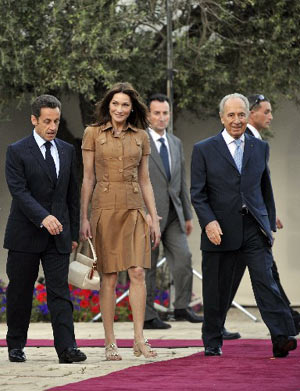In an essay by Dr. Tsilla Herscho, a research associate at the Begin-Sadat Center for Strategic Studies, she points out that though Sarkozy's warm words of support for Israel appear to laud a new era of closer Franco-Israeli ties, France continues to "immorally equate acts of terror with (Israel's) acts of defense."
In his speech during a special session of the Knesset (parliament) on Monday, Sarkozy called on Israel to end its settlement activity in East Jerusalem and the West Bank, saying there would be "no peace without a solution to the problem of the Palestinian refugees," a sticking point in negotiations between the two sides.

France's President Nicolas Sarkozy (L) and his wife Carla Bruni-Sarkozy (C) arrive for a meeting with Israel's President Shimon Peres (R) in Jerusalem June 22, 2008. (Xinhua/AFP Photo)
France "fiercely demands the removal of checkpoints which are intended to protect Israeli citizens from acts of Palestinian terror...and blames Israel for the economic damage incurred by the Palestinian National Authority (PNA) and for the PNA's failure to establish effective governance."
Hershco further notes that France's insistence on viewing Hezbollah not as a terrorist organization but rather an integral part of Lebanese political life combined with a recent warming in relations with Syria, believed by Israel to fund Hezbollah, could dim Franco-Israeli relations on the road.
Professor Gerald Steinberg of Bar Ilan University brushed aside France's expectations of Israel as articulated by Sarkozy regarding the return of territories seized in 1967 and Arab refugees as "relatively empty words," noting that "the visit allows for a dialogue which involves listening and dealing with the situation at hand."
"Palestinian issues are driven by the Americans, the outcome of which will not depend on what Europe does," he said.
(Xinhua News Agency June 25, 2008)